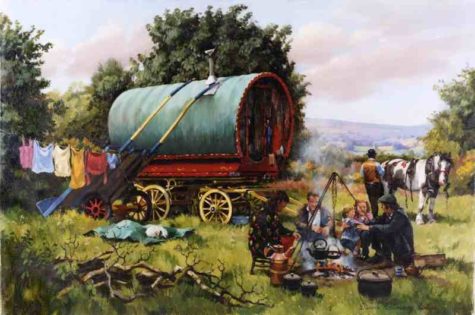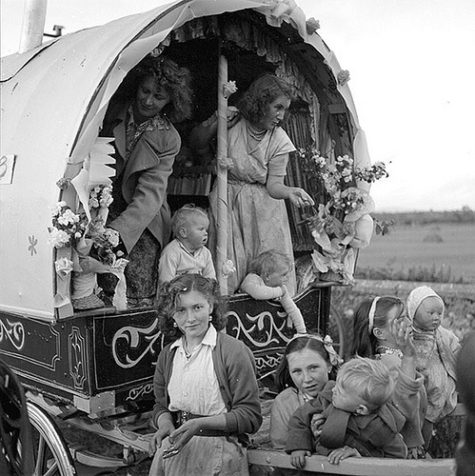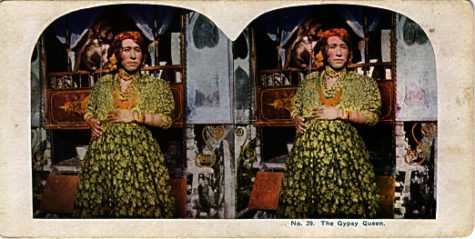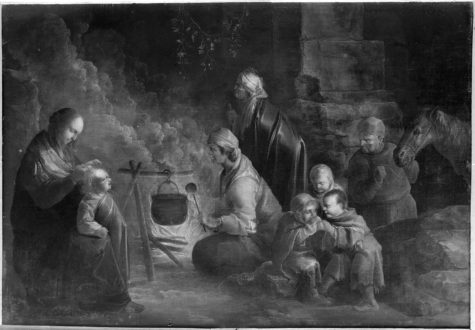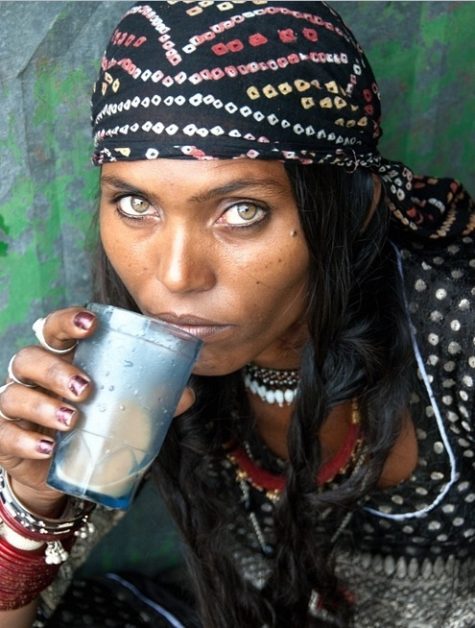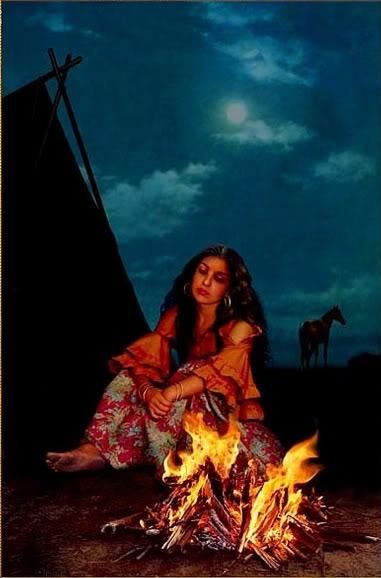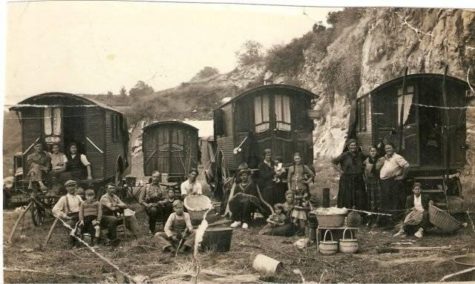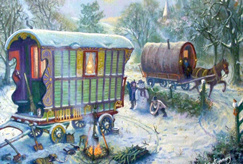Monthly Archives: June 2017
Mint – A Gypsy Favorite
As for the garden of mint, the very smell of it alone recovers and refreshes our spirits, as the taste stirs up our appetite for meat.
~Pliny

Mint is another commonly used herb and a real favorite with the true Romanies. Mint is sweet and refreshing, try a few chopped fresh leaves in a salad, also chop and add to pea soup and add it to the water of potatoes when they are nearly cooked. Mint is used with so many foods, because it is a great aid to digestion.
Romanies always use mint with carrots. They cook the carrots until tender in salted water and then strain them. Then add a sprinkle of sugar and a spoonful of chopped mint to the pan, return the strained carrots and shake them over a gentle heat until they are coated and reheated.
Gypsy Caravan
I whiled away all the years of my youth
Tending my fields searching for the truth
Gazing past horizons to the west
Hoping I’d see them before my death.
Then one day they rumbled by
A gypsy caravan the color of the sky
Water sparkled as the wheels turned round
Across the river into the town.
Chorus:
There’s a gypsy caravan,
Rolling across the land,
They got singers and a dancing girl
That can make you dream about the wide wide world.
And their captain was a handsome man
He had a sword and what looked like a plan
But there was something wrong in his eyes
Bloodshot and bleary from too many nights
So we stayed up late in that inn
Drinking over our secret sins
Each one wanting what the other one had
We both said the “You’re the lucky man.”
Chorus:
There’s a gypsy caravan,
Rolling across the land,
They got singers and a dancing girl
That can make you dream about the wide wide world.
Late the morning we agreed to trade
Each other’s lives for a later date
Twenty years later again we’d meet
And see if we’d both really found our dreams
So I finally got to see the world
And found for myself a blue eyed girl
We raised three kids in the back of that tent
Rolling through the night they were heaven sent
Chorus:
There’s a gypsy caravan,
Rolling across the land,
They got singers and a dancing girl
That can make you dream about the wide wide world.
Twenty years later again I returned
Only to find out what the we both had learned
He had three kids and a wife of his own
And those green fields had turned into his home
We agreed to go our separate ways
And I’ll not see him til my dying day
The man who gave my dreams to me
Where I found a love for eternity
Chorus:
There’s a gypsy caravan,
Rolling across the land,
They got singers and a dancing girl
That can make you dream about the wide wide world.
Author unknown
In The Days We Went A-Gipsying
When as a lad I trudged along in the brick-yards, now more than forty years ago, I remember most vividly that the popular song of the employees of that day was
“When lads and lasses in their best
Were dress’d from top to toe,
In the days we went a-gipsying
A long time ago;
In the days we went a-gipsying,
A long time ago.”
Every “brick-yard lad” and “brick-yard wench” who would not join in singing these lines was always looked upon as a “stupid donkey,” and the consequence was that upon all occasions, when excitement was needed as a whip, they were “struck up;” especially would it be the case when the limbs of the little brick and clay carrier began to totter and were “fagging up.” When the task-master perceived the “gang” had begun to “slinker” he would shout out at the top of his voice, “Now, lads and wenches, strike up with the:
“‘In the days we went a-gipsying, a long time ago.’”
And as a result more work was ground out of the little English slave. Those words made such an impression upon me at the time that I used to wonder what “gipsying” meant.
Somehow or other I imagined that it was connected with fortune-telling, thieving and stealing in one form or other, especially as the lads used to sing it with “gusto” when they had been robbing the potato field to have “a potato fuddle,” while they were “oven tenting” in the night time. Roasted potatoes and cold turnips were always looked upon as a treat for the “brickies.”
I have often vowed and said many times that I would, if spared, try to find out what “gipsying” really was. It was a puzzle I was always anxious to solve. Many times I have been like the horse that shies at them as they camp in the ditch bank, half frightened out of my wits, and felt anxious to know either more or less of them. From the days when carrying clay and loading canal-boats was my toil and “gipsying” my song, scarcely a week has passed without the words
“When lads and lasses in their best
Were dress’d from top to toe,
In the days we went a-gipsying
A long time ago,”
ringing in my ears, and at times when busily engaged upon other things, “In the days we went a-gipsying” would be running through my mind.
In meditation and solitude; by night and by day; at the top of the hill, and down deep in the dale; in the throng and battle of life; at the deathbed scene; through evil report and good report these words, “In the days we went a-gipsying,” were ever and anon at my tongue’s end. The other part of the song I quickly forgot, but these words have stuck to me ever since.
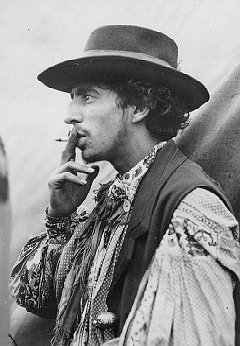 On purpose to try to find out what fortune-telling was, when in my teens I used to walk after working hours from Tunstall to Fenton, a distance of six miles, to see “old Elijah Cotton,” a well-known character in the Potteries, who got his living by it, to ask him all sorts of questions.
On purpose to try to find out what fortune-telling was, when in my teens I used to walk after working hours from Tunstall to Fenton, a distance of six miles, to see “old Elijah Cotton,” a well-known character in the Potteries, who got his living by it, to ask him all sorts of questions.
Sometimes he would look at my hands, at other times he would put my hand into his, and hold it while he was reading out of the Bible, and burning something like brimstone-looking powder—the forefinger of the other hand had to rest upon a particular passage or verse; at other times he would give me some of this yellow-looking stuff in a small paper to wear against my left breast, and some I had to burn exactly as the clock struck twelve at night, under the strictest secrecy.
The stories this fortune-teller used to relate to me as to his wonderful power over the spirits of the other world were very amusing, aye, and over “the men and women of this generation.” He was frequently telling me that he had “fetched men from Manchester in the dead of the night flying through the air in the course of an hour;” and this kind of rubbish he used to relate to those who paid him their shillings and half-crowns to have their fortunes told.
My visits lasted for a little time till he told me that he could do nothing more, as I was “not one of his sort.”
From: Gipsy Life, by George Smith, 1880
Romany or Gypsy Caravans
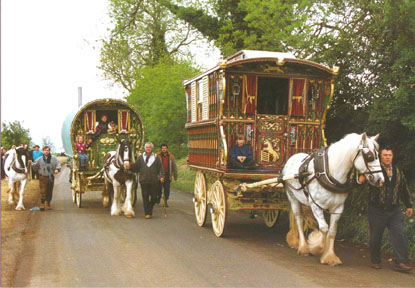
The sight of a Vardo or Romany caravan (often known to the non-travelling population as a ‘gypsy caravan’) is exciting for its rarity and conjures up an unhurried, picturesque pre-industrial lifestyle: images of Wind in the Willows, of a bow-topped roof with extravagantly carved and painted woodwork proceeding slowly behind a large and placid carthorse along narrow hedged lanes.
Referred to by travellers and gypsies as a ‘vardo’ or ‘wagon’, the horse-drawn caravan has been in use in the British Isles since the mid-nineteenth century. Initially made by the travellers themselves, the wagons began to be built by dedicated craftsmen around 1880, when the best examples began to be developed and their distinctive characteristics emerged. Fred Hill, Bill Wright and Duntons are some of the famous builders of the time. This particularly creative period lasted until the 1920s, but the wagons have continued to be made – though on a much more modest scale – until the present day.
There are five main types of vardo: The Brush, The Reading, the Ledge, The Bow Top and the straight-sided ‘Showman’s’ wagon; but within these categories no caravan is exactly the same. There are, however, typical characteristics – the pull-out bed, the child’s cupboard bed, plenty of cupboards and drawers; a little stove on the left-hand side; intricately carved and painted woodwork; pretty floral fabric lining the interior of the roof; and usually a window to the rear. The entrance was either ‘open-lot’ (open, but with curtains or canvas panels for protection) or fixed up with ‘stable’ doors with lace-clad windows.
The inhabitants took great pride in their caravans and enormous pains to decorate both inside and out as beautifully as possible. For the matriarch of the family, the caravan was both a status symbol and embodiment of domestic capability. The best china would be positioned so that it was visible from outside when the curtains were drawn aside or the doors flung open; copper pans would hang sparkling from pegs; lace, embroidery and fringing would embellish every surface and cushion; and the whole place would be spotlessly clean and tidy. Although small, a wagon would have been a permanent home to a travelling family. With plenty of imaginative storage, including a pan cupboard and a rack to the outside rear, life inside would have been perfectly manageable. The small stove heated up the space very effectively, so that the wagon provided a year-round living space. The wagons were light enough to be pulled easily by one dray horse.
On the road, the clip-clop of the horse’s hooves, the gentle sway of the wagon and the scent of fresh air through the front opening must have made it a wonderful form of travel. Many is the story where gypsies have been forced for one reason or another to abandon their wagons and live in ordinary houses, subsequently experiencing unhappiness – even depression, as well as bad cases of claustrophobia.
Horse-trading was an obvious vocation for gypsies, and the Appleby Horse Fair in Cumbria every summer was an essential destination. For many years, decorated wagons and brightly painted wares have made the event on Gallows Hill just outside Appleby one of the most colourful in the country. A place for gypsy families to catch up with each other’s news as well as for deals to be made and fun to be had, The Appleby Horse Fair is one of the largest and most important in romany fairs in Europe. In the 1960s, town councils began to ban fairs (failing in the case of Appleby) and make it very difficult to strike camp on roadsides. This kind of persecution, as well as the increase in motorised traffic, is one of the reasons why the gypsy caravan disappeared so quickly from view.
Nowadays, there is a revived interest in the authentic Vardo, partly for its antique value. Also, entrepreneurs are setting up horse-drawn holidays or letting out caravans to film or TV companies. And small businesses who deal in original and replica vardoes are doing a brisk trade.
From: Cottage Holiday Wales
A Gypsy Queen
An Old Gypsy Cure for A Cold
Though not liable to many disorders, the gypsies in Eastern Europe, from their wandering, out-of-doors life, and camping by marshes and pools where there is malaria, suffer a great deal from fevers, which in their simple system of medicine are divided into two types:
- The shilale – chills or cold
- The tate shilalyi – “hot-cold,” or fever and ague.
For the former, chills or cold, the following remedy is applied:
Three lungs and three livers, of frogs are dried and powdered and drunk in spirits, after which the sick man or woman says the following incantation:
“Čuckerdya pal m’re per Čáven save miseçe! Čuckerdya pal m’re per Den miseçeske drom odry prejiál!
“Frogs in my belly Devour what is bad Frogs in my belly Show the evil the way out!”
By “the evil” is understood evil spirits. According to the old Shamanic belief, which was the primæval religion of all mankind, every disease is caused by an evil spirit which enters the body and can only be driven out by magic.
How Gypsies Became Fortune-tellers
The following is an excerpt from: Gypsy Sorcery and Fortune Telling, a book written in 1891 by Charles Leland, President of the Gypsy Lore Society in London. It’s a bit of a hard read, but I found it interesting, so I’m sharing it here:
As their peculiar perfume is the chief association with spices, so sorcery is allied in every memory to gypsies. And as it has not escaped many poets that there is something more strangely sweet and mysterious in the scent of cloves than in that of flowers, so the attribute of inherited magic power adds to the romance of these picturesque wanderers.
Both the spices and the Romany come from the far East–the fatherland of divination and enchantment. The latter have been traced with tolerable accuracy, If we admit their affinity with the Indian Dom and Domar, back to the threshold of history, or well-nigh into prehistoric times, and in all ages they, or their women, have been engaged, as if by elvish instinct, in selling enchant. merits, peddling prophecies and palmistry, and dealing with the devil generally ill a small retail way.
As it was of old so it is to-day:
Ki shan i Romani– Adoi san’ i chov’hani.
Wherever gypsies go, There the witches are, we know.
It is no great problem ill ethnology or anthropology as to how gypsies became fortune-tellers. We may find a very curious illustration of it in the wren. This is apparently as humble, modest, prosaic little fowl as exists, and as far from mystery and wickedness as an old hen. But the ornithologists of the olden time, and the myth-makers, and the gypsies who lurked and lived in the forest, knew better.
They saw how this bright-eyed, strange little creature in her elvish way slipped in and out of hollow trees and wood shade into sunlight, and anon was gone, no man knew whither, and so they knew that it was an uncanny creature, and told wonderful tales of its deeds in human form, and to-day it is called by gypsies in Germany, as in England, the witch-bird, or more briefly, chorihani, “the witch.”
Just so the gypsies themselves, with their glittering Indian eyes, slipping like the wren in and out of the shadow of the Unknown, and anon away and invisible, won for themselves the name which now they wear.
Wherever Shamanism, or the sorcery which is based on exorcising or commanding spirits, exists, its professors from leading strange lives, or from solitude or wandering, become strange and wild looking. When men have this appearance people associate with it mysterious power.
This is the case in Tartary, Africa, among the Eskimo, Lapps, or Red Indians, with all of whom the sorcerer, voodoo or medaolin, has the eye of the “fascinator,” glittering and cold as that of a serpent. So the gypsies, from the mere fact of being wanderers and out-of-doors livers in wild places, became wild-looking, and when asked if they did not associate with the devils who dwell in the desert places, admitted the soft impeachment, and being further questioned as to whether their friends the devils, fairies, elves, and goblins had not taught them how to tell the future, they pleaded guilty, and finding that it paid well, went to work in their small way to improve their “science,” and particularly their pecuniary resources. It was an easy calling; it required no property or properties, neither capital nor capitol, shiners nor shrines, wherein to work the oracle.
The Moon Smiles
This is a poem that talks about how both life and death are a mixture of sadness and joy.
Moonlight
O chonut asal amen
…Teochonut korhavola
teamen dikhasa
sad
kon vakarela
Kaj e phake erovimase
thaj e asamase
ka arakhadon
English Translation
The moon smiles
down on us
around the fire
we weep
wahh!
Our crying flies up
among the moonbeams floating down
heaven smells our tears
we sense the beams
If the moon is blinded we can see
who is speaking…
With one wing of tears
and one laughter
we take off to meet him.
-Rajko Durich
A Collection of Quotes
Some of these quotes are about Gypsies, some are by Gypsies. What they really show is how badly, inhumanly,and unfairly Gypsies were treated, as well as the strength they had to stand together and fight!
“No we were not always slaves; see our brothers who live in the mountains. They know nothing of chains, neck irons, whippings and hunger and thirst…Let us go free!!”
~Mateo Maximoff
“They scarcely ever stop in one place more than thirty days..they move from field to field with their oblong tents, black and low, like arabs.”
~Simeon Simeonis, a monk in Crete in 1322
“Their ears be nailed to a tree, and cutted off, and them banished the county; and if thereafter they be found again that they be hanged…the idle people calling themselves Egyptians.”
~Scottish law against vagrants, 1579
“I saw a woman guard kill four Gypsy children for eating leftover food.”
~Barbara Richter 1963
“We are people of worth, not thieves or murderers. History has played with us, thrown us down and split us up. But we must seek our destiny..by coming together as one people.”
~Jarko Jovanovic, 1978
“Well this policeman stopped my motor and asked where I live. ‘First tree I come to I can climb.’ I said”
~Gypsy Girl 1972
“It is true, as the Lovara Rom say, “Amari shib si amari zor” ‘Our language is our strength.”
~Dr Ian Hankock, a Gypsy 1975
“Gypsies express in their music their grief and their joy…Music accompanies their life from the earliest childhood until death itself.”
~Dr Jan Cibula 1978
“The greatest strength of Gypsies is their invisibility…they merge into the mass of strangers in the street.”
~Ronald Lee 1971
More to come but that’s all for now.
~Sovereign Brigand 1998
